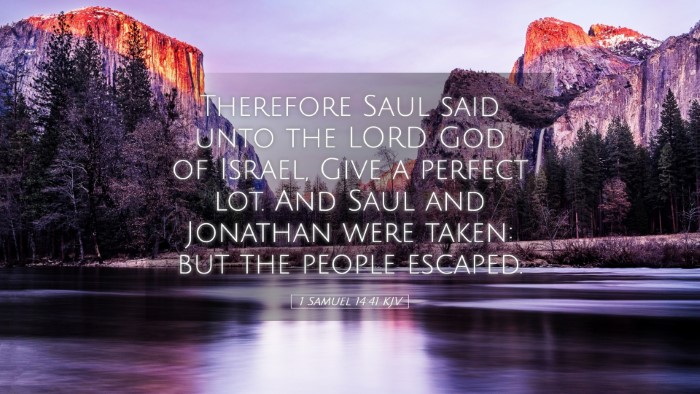Commentary on 1 Samuel 14:41
Verse Context: 1 Samuel 14:41 states, “Therefore Saul said to the Lord, ‘God of Israel, if this guilt is in Your people Israel, give Urim; but if this guilt is in Jonathan and me, give Thummim.’ And Jonathan and Saul were taken, but the people escaped.” This verse occurs in a pivotal narrative where King Saul seeks to determine God's will regarding a perceived sin among his people after a surprising military engagement. It reflects both the gravity and the complexity of leadership and divine guidance.
Historical Background
The events of 1 Samuel 14 illustrate a critical moment in Israel's history. The Israelites were engaged in conflict with the Philistines, and the text depicts both spiritual and tactical challenges faced by Saul. The Urim and Thummim were sacred lots used by the High Priest to discern God’s will, highlighting the importance of divine guidance for national leadership.
Commentary Insights
Matthew Henry's Commentary
Matthew Henry emphasizes the serious nature of Saul's inquiry and the urgency of divine guidance. He notes that Saul’s appeal to God demonstrates an acknowledgment of the possibility of sin affecting his leadership. Henry observes that the Urim and Thummim were essential tools for discerning God's direction, and this ritualistic approach signifies the depth of Saul’s desperation. Moreover, Henry points out the relational dynamics at play between Saul and his son Jonathan, revealing the potential tension of shared guilt and leadership responsibilities.
Albert Barnes' Commentary
Albert Barnes provides a thorough examination of the spiritual implications of casting lots. He reflects on how Saul’s use of the Urim and Thummim illustrates a leader’s dependency on divine intervention in governance. Barnes interprets this event as a revelation of Saul’s character, aligning it with themes of repentance and accountability before God. He stresses that the fate of Jonathan being taken with Saul implicates both in the broader narrative of Israel’s disobedience, suggesting that sin permeates even the highest offices of power.
Adam Clarke's Commentary
Adam Clarke offers a nuanced interpretation of the text, noting that the method chosen by Saul to discern God’s will was traditional among Jewish leaders. Clarke explores the significance of the terms “Urim” and “Thummim,” suggesting they symbolize light and perfection, respectively. He argues that the inquiry indicates a shift in Saul’s leadership, shifting from autonomous decision-making to seeking divinely sanctioned direction. Clarke also remarks on the theological implications of the passage, emphasizing the importance of constant communion with God for those in authority.
Theological Reflections
This verse invites profound theological reflection on the nature of divine communication and human responsibility. Saul’s inquiry using the Urim and Thummim reveals a hierarchical structure in spiritual discernment and a belief in God’s active involvement in human affairs. For theologians, this suggests a theological framework where governance must align with divine will to ensure national integrity.
Practical Application
For pastors and church leaders, this passage underscores the importance of seeking God’s guidance in decision-making processes within the church and community. Saul’s example demonstrates the necessity for leaders to remain attuned to divine input, especially in moments of crisis. The passage encourages a culture of prayer and reliance on scripture as tools for understanding God's will.
Conclusion
The inquiry posed by Saul in 1 Samuel 14:41 reflects both a leadership dilemma and a community crisis. The interplay between divine will and human action reveals the fragility and complexity of leadership in times of uncertainty. Collectively, the insights from Matthew Henry, Albert Barnes, and Adam Clarke present a holistic view that is beneficial for pastors, students, theologians, and scholars as it invites further contemplation on the intricate relationship between divine guidance and human authority.


